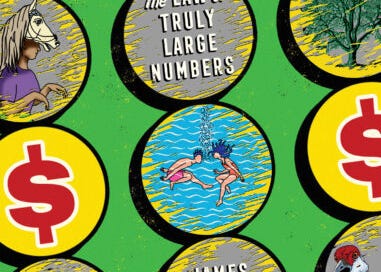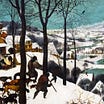James Kimbrell, The Law of Truly Large Numbers. University of Pittsburgh Press, 2025.
Review by Samuel Schaefer
I first met James ‘Jimmy’ Kimbrell at a dive bar called the Salty Dawg. Our conversation ranged from literature, to real estate, and to the Louisiana bayou. In subsequent rendezvous at the Salty Dawg, I got Jimmy to read a few of my poems; to which he critiqued, in his slow Mississippi accent, “You’re trying too hard to be poetic.” That’s damning to a young poet. His point—that there’s a fine line between being poetic and trying to be poetic—stuck with me. As I thought about it, I realized the truth of it; the reason that Nature is so poetic is because it isn’t trying to be poetic, it just is. Poets, the young ones in particular, get caught up in the romance of being a poet and profound deep-thinker and write with a single-minded aim: achieve some kind of brilliance. Yet, their poems end up contrived and flowery. I, for one, am guilty of this.
Jimmy, who is an English professor at FSU and author of several books of poetry, has the benefit of being much older. His mentor was the great American poet Charles Wright, and like Wright, he’s a master at crafting vivid images, moments in time, and bringing the reader into them. His eye for details—recalling the smell of a bedroom or the texture of one’s jeans—lends his poems a fabric that is both rooted in Jimmy’s particular life while finding resonance in the universality of every human’s life. For Jimmy, being poetic is the only way to be.
His newest book, The Law of Truly Large Numbers, is full of windows into moments from the past. These moments are childhood memories of the gambling exploits of the men in his family or of the adolescent embarrassments of a teenage boy at camp. The title of the book refers to a concept developed by the Mathematicians Persi Diaconis and Frederick Mosteller. It states that in a large enough sample size, even the most unlikely of scenarios are likely to happen. For example, if you set the odds at 1/100, something will happen once every hundred times, but if those odds happen ten times, then that one thing will happen ten times for every thousand. This idea imbues the title poems with a sense of importance; these moments, which seem like the makings of a normal life, are treasures we’re lucky to have. In the poem, Jimmy writes,
…What if civilization
bottoms out backing down our driveway?
Or you can populate two New York Cities
with people that share your birthday.
Isn't that, and that, and that a coincidence?
A miracle might strike at any moment.Throughout history, especially in our cushy modern lives, there’s a risk to just about everything. That risk might be good, it might be bad, but when you walk out the door, you roll the dice that you’ll win the lottery or get hit by a bus. In the final two lines of this excerpt, the words ‘coincidence’ and ‘miracle’ are put into relationship with one another. Jimmy’s history with gamblers goes back to his earliest days. Chance offers the possibility that anything might happen, even the rarest, most unlikely of things. Applied to life, these ‘rare’ occurrences are in fact the stuff of life; falling in love, the tragedy of lost relatives, the embarrassments of young boys as well as the excitement of kids breaking the rules. Jimmy flips the equation on its head and thinks, “Man, thank God my life has been full of these rare occurrences.” He says all of this looking backwards after having lived a life. Perhaps that's cheating—the gambler praising the Black Jack game after having won — but I think it's more like a lesson learned by a seasoned poker player. While some see the determinist tendencies of chance as terrors of a world without God, Jimmy compares them to the rush of pulling the lever on a slot machine—equal measures good and bad.
Take another poem. In “Group Meditations, Camp Bratton-Green, 1978”, Kimbrell tells the story of an “unplanned erection” that happened to him when he was a boy at camp. Jimmy’s sense of humor jumps off the page here in a wry, unassuming smile. He insinuates that, through this embarrassing moment, his ego had “departed through [his] penis.” I heard this poem read at a public reading, and those four words, which Jimmy delivered in a deadpan, staccato tone, ended in a short pause before even Jimmy burst out laughing! Yet, he takes this funny moment as an opportunity to tell us something about the world. Set against the backdrop of a Zen meditation ritual, we realize at the end that the goal of this meditation is achieved despite the unconventional means. It is these unsuspecting moments of success that Kimbrell glorifies, and he concludes that they come around all of the time—he provides a whole book of poems devoted to them.
Sadness also provides a conduit for extraordinary events to emerge as well. Many of his poems discuss tragedy and the loss of family members and friends as well as missed opportunities. Kimbrell sets these poems up as moments of misfortune, but at the same time, those misfortunes are turned on their heads. In a poem called “Questions From My Daughters”, Kimbrell reflects on a query from his daughter Alli: why do we need sadness? He seems to suggest that sadness is an inconvenient reality that besets humans much to their chagrin. He concludes with these lines:
Like weather, sadness just is. Like weather, sadness is what
we're working with, the mojo, the adios, the unforeseen
logos, the tightrope antidote for a snake-bit Mississippi.Here, Jimmy reverses the common notion of sadness to suggest that it is the ‘antidote’ where he comes from. Not only that, it is the ‘unforeseen logos’ — an unmistakable allusion to the beginning of the Gospel of St. John. Sadness has always been there in this southern place, seeping into the old plantation soil and the humid, mosquito air. Sadness is what they have been dealt, and they really have no choice but to work with it. Perhaps, sadness is a matter of perspective. This is the gambler in full force. Losses only hurt if you stop playing the game.
The book’s epigraph comes from 1 Corinthians: “For now we see only a reflection as in a mirror; then we shall we face to face.” I returned to this after finishing the book, and I believe it puts the entire thing in perspective. The epigraph is about sight, which is really what the entire book is about: it’s about how we see things. The Law of Truly Large Numbers compels us to admit that those rarities of human experience might actually come around more often than we think. When Jimmy juxtaposes this scientific law with a verse from the Bible, he creates a bit of magic in the world, and Jimmy would say that’s a good thing. Many of the scenarios in these poems come down to a role of the dice. However, there is a nod towards the fact that it isn't how it should be. That there’s some magic in rolling the dice. Maybe what looks like rolling the dice to us, is actually the complete opposite to some other being.
For now we see only a reflection as in a mirror; then we shall we face to face.
Samuel Schaefer is a writer from Tallahassee. His writing has appeared at the Front Porch Republic, American Spectator, and in The Rialto Book Review. Follow him on X or at his Substack: The Pony Express.






Great review and intro to a poet I hadn’t known of.
It has what the kids call “plot armour” as the reviewer
sets out his personal connections to the poet up front
so you know it won’t be negative.
But that’s OK!